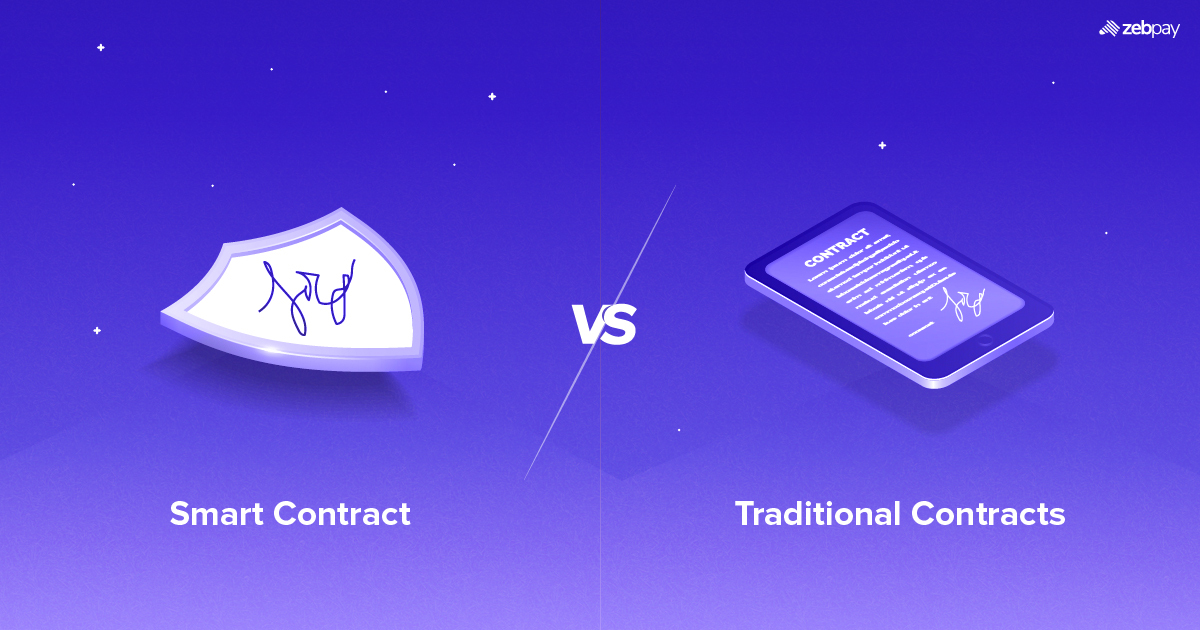A contract is an agreement between two or more parties with specific terms to exchange value. They can be legally binding based on the nature of the document, whether it is an oral or written contract, and whether it is enforceable by law. Smart contracts are computer programs that automatically execute when pre-determined terms are agreed upon by consenting parties. They have emerged in the past few years due to the rise of blockchain technology.
Smart contracts provide more privacy than traditional contracts, and their execution is significantly quicker. They are democratizing access by allowing any user to use them and conduct business efficiently. Technology is being adopted by us at varying levels in our daily lives. Most daily activities are becoming automated, including contracts.
Traditional Contracts: An Overview
Traditional contracts are written or verbal agreements on specific terms between two parties. Some oral contracts can be legally binding, but contract breaches can be difficult to prove. Written contracts are usually legally binding if they contain a subject that details terms describing the contract’s motive. They are only legally binding if they have the legal authority to agree. Some of its main characteristics include:
- Enforceability: Traditional contracts are enforceable in courts as they have well-established legal frameworks.
- Long-standing frameworks for dispute: Traditional contracts can benefit from established dispute resolution systems such as litigation or arbitration to resolve conflicts and enforce contractual terms.
- Control over information and confidentiality: Traditional contracts depend on third parties to maintain control over sensitive information. They can also have confidentiality clauses to limit access to contractual terms and provide a certain level of privacy for sensitive information.
- Dependency on intermediaries: Traditional contracts depend on intermediaries such as lawyers to draft and execute the terms and conditions of it. Intermediaries can cause additional costs, delays, and human errors.
- Limited automation: Traditional contracts are not automated like Smart contracts and require manual monitoring and execution, which can lead to human error and time delays.
- Prone to tampering and fraud: Traditional contracts are vulnerable to fraud, especially paper-based contracts that can be forged or lost, leading to contract breaches and disputes.
Smart Contracts: An Introduction
Smart contracts are self-executing computer programs on blockchain networks. They do not need intermediaries and are nearly impossible to tamper with or fake as they are immutably stored on a distributed ledger. There are three conditions, namely subject, consideration, and capacity, to make Smart contracts legally enforceable. Contract breaches are rare, as contract terms are automatically executed once met. Some of its main features include:
- Automation: Developers code the smart contract to automate contract execution without intermediaries. They can automatically execute specific actions based on predefined terms, leading to the streamlining of processes.
- Decentralization and trustlessness: Smart contracts operate on decentralized crypto networks that improve user trust and eliminate the dependency on intermediaries.
- Digital asset integration: Smart contracts can easily integrate with digital assets such as crypto tokens and blockchain services.
Differences Between Smart Contracts and Traditional Contracts
Automation
Smart contracts are self-executing and can automatically execute when pre-conditions are met. They automate contract execution, which can save time and money as they eliminate the need for intermediaries. Traditional contracts require manual enforcement and execution, which is expensive and time-consuming.
Transparency
They are transparent, as all parties can view the contract terms at all times. This feature helps them provide high levels of trust and reduce dispute risks. Traditional contracts can be subject to interpretation, leading to disagreements and disputes.
Immutability
Smart contracts are immutable, as they cannot be altered or edited once executed. This feature helps to provide robust security and reduces tampering and fraud risks. Traditional contracts can easily be altered, leading to disputes.
Speed
They can be implemented quickly as they are automated and do not need intermediaries, which can save time and reduce delays. Traditional contracts can take time to create and complete, leading to increased costs and delays.
Cost
Smart contracts are more cost-effective than traditional contracts as they are executed quickly and do not need intermediaries. Conventional contracts are comparatively expensive to create and complete, reducing profitability and increasing costs.
Read more: Smart Contracts VS Blockchain
Use Cases for Smart Contracts
Financial Contracts and Transactions
Companies can deploy Smart contracts to accurately record financial transactions while also improving the speed and security of this process. Smart contracts help maintain the integrity of sensitive documents and improve financial reporting. It mainly reduces the trust needed between parties as it is automatically executed when pre-conditions are fulfilled.
Supply chain management and tracking
Smart contracts can also be deployed in the supply chain sector, as they can improve the tracking of items with the help of IoT devices. It can automate everyday tasks and payments, improving the efficiency, speed, and security of the supply chain process.
Intellectual Property (IP) and Copyright Protection
Smart contracts can help maintain intellectual property and copyright protection. They can simplify and facilitate royalty payments from IP. They can record all aspects of a copyright asset, such as fingerprints or a digital ID. For example, digital artists who mint NFTs can add a Smart contract to enable them to receive income from subsequent sales of the NFT.
Real Estate Transactions and Title Transfers
Smart contracts can facilitate and speed up real estate transactions. Title transfers can be programmed into a Smart contract and executed automatically. Smart contracts will automatically change ownership once the buyer completes payment.
Insurance Claims and Settlements
They can significantly contribute to the insurance sector, which is full of disputes. They can automate policies, lower insurer costs, and ultimately lower premiums. Policyholders can get compensated faster through automated claims payments.
Decentralized Finance (DeFi)
DeFi provides an alternative to the traditional financial system by offering similar services such as trading, lending, borrowing, and other services. DeFi has also introduced new financial instruments and models that can immensely benefit its users, especially the unbanked. It increases transparency and accessibility and reduces costs, lowering the barrier to entry into mainstream financial systems.
Read more: Smart Contracts in DeFi
Benefits and Advantages of Smart Contracts

Automation and efficiency in contract execution
One of the significant advantages of smart contracts is contract execution automation. No intermediaries can control or tamper with contractual terms and conditions. It can automate business processes and resolve issues or disputes where trust is a factor.
Enhanced Security and Reduced Risks of Fraud
Another benefit of smart contracts is robust network security. Smart contracts use encryption to enable processes to operate securely. They run on blockchain networks with immutable data. Smart contract data cannot be altered and is stored securely.
Cost Savings and Improved Accuracy
Smart contracts make blockchain transactions more cost-effective as they remove the dependency on intermediaries. They make transactions quicker and reduce overall costs.
Speed and Real-Time Settlements
Smart contract execution is much faster than traditional contracts. All parameters and terms are already defined within them, so they only need to match them before they start the contract execution process.
Transparency and Auditability
Smart contracts provide a transparent method to enforce data policies, automate processes, and improve data compliance and security. The public distributed ledger keeps a comprehensive record of data transactions, which are easily auditable.
Increased Trust and Reduced Dependency on Intermediaries
Smart contacts operate on a trustless system, meaning there is no need to trust intermediaries. There is no need to depend on intermediaries to carry out a transaction.
Limitations and Challenges of Smart Contracts
Limited Legal Recognition and Enforcement
They operate in a legal landscape that keeps evolving. There are regulatory challenges, Smart contract enforceability, jurisdictional issues, and ensuring compliance with current regulations.
Complexity and Potential for Coding Errors
You must have technical expertise and knowledge of blockchain technology to create smart contracts. The complexity of Smart contract coding can lead to errors, compromising the integrity and security of the smart contract.
Immutability and Inflexibility of Smart Contract
One of the key features of smart contracts is that they cannot be altered once deployed. This feature can be detrimental, as Smart contracts with errors or vulnerabilities cannot be fixed once deployed.
Privacy and Confidentiality Concerns
Smart contracts are stored on a public blockchain network, leading to privacy issues and concerns. Smart contract terms are transparent, and users may have problems with how their personal or sensitive business information is stored.
The Future of Contract Automation
Lawyers can use smart contracts to simplify transactional work, digitally sign, and immutably store legal documents and agreements. They can reduce the time spent preparing and maintaining legal documents, resulting in cost savings. They can democratize access to the justice system by reducing legal fees and other legal complexities. They can streamline, automate, and secure many legal processes. They can integrate with traditional legal systems to make them more efficient and reduce legal costs.
There is a need to upskill and educate professionals on using smart contracts. Users must educate themselves to learn to write and interpret Smart contract codes. There is a learning curve, and it can take time for Smart contract adoption. They operate in a legal landscape that is still evolving. They have regulatory challenges such as jurisdictional issues, the enforceability of smart contracts, and compliance with current regulations.
Read more: Smart Contract Wallets
Conclusion
Smart contracts are perfect for transactions that need high levels of security and automation. They are ideal for crypto transactions, decentralized applications, and supply chain management. The automation and transparency of smart contracts can increase process efficiency, and reduce fraud.
Traditional contracts are more suitable for complex transactions that require legal enforceability and human judgment. Situations that require negotiations and where contract terms are subjective may benefit from the flexibility of traditional contracts. They also offer a well-established legal framework to resolve contract breaches and disputes.
Smart contracts are still relatively new, and their regulations are still evolving. They offer exciting applications and possibilities but must address challenges, such as legal enforceability and other coding vulnerabilities. We may witness a hybrid future that combines the strengths of traditional and smart contracts. Conventional contracts can outline the general terms of an agreement, while specific clauses can be executed through smart contracts. This hybrid approach can automate contract processes and ensure transparency.
To stay up to date with the latest crypto news, visit ZebPay blogs. Click on the button below to trade on ZebPay.
Frequently Asked Questions (FAQs)
What is the main difference between smart contracts and traditional contracts?
Smart contracts are self-executing and can automatically execute when pre-conditions are met. They automate contract execution, which can save time and money as they eliminate the need for intermediaries. Traditional contracts require manual enforcement and execution, which is expensive and time-consuming.
What are some common use cases for smart contracts?
Some smart contract use cases include DeFi, supply chain management, IP protection, real estate transactions and more.
What advantages do smart contracts offer over traditional contracts?
Smart contracts make blockchain transactions more cost-effective as they remove the dependency on intermediaries. They make transactions quicker and reduce overall costs. Smart contacts operate on a trustless system, meaning there is no need to trust intermediaries. There is no need to depend on intermediaries to carry out a transaction.
Are smart contracts legally enforceable?
They operate in a legal landscape that keeps evolving. There are regulatory challenges such as enforceability, jurisdictional issues, and ensuring compliance with current regulations.







